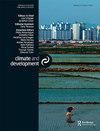Globalization and its environmental effects: assessing the role of de facto and de jure conditions in trade, financial and information (ICT) developments in West Africa
IF 3.5
3区 环境科学与生态学
Q1 DEVELOPMENT STUDIES
引用次数: 0
Abstract
ABSTRACT This paper investigates whether de facto and de jure conditions in trade, financial, and information globalization affect CO2 emissions in the West African sub-region using the Method of Moments Quantile Regression (MMQR) with fixed effects. The Stochastic Impact by Regression on Population, Affluence, and Technology (STIRPAT) framework is extended to incorporate renewable energy consumption and globalization for the period 1990-2018. The results highlight the significant environmental deterioration effects of income, population and energy intensity, and the mitigation effect of renewable energy consumption in the West African sub-region. Further evidence shows that: (i) de facto trade globalization increase CO2 emissions though insignificant, while de jure conditions mitigate CO2 emissions and have a strong significant impact across the conditional distribution; (ii) the benign environmental impact of financial globalization in the sub-region is driven by de jure conditions and the impact is significant across the entire distribution; (iii) information globalization reduces CO2 emissions with de jure conditions having the dominant effect. Overall, de jure conditions in trade, financial, and information globalization are essential for mitigating CO2 emissions in the sub-region. Hence, there is need to mainstream environmental issues into the institutional framework for climate change mitigation with emphasis on renewable alternatives.全球化及其环境影响:评估事实和法律条件在西非贸易、金融和信息技术发展中的作用
本文章由计算机程序翻译,如有差异,请以英文原文为准。
求助全文
约1分钟内获得全文
求助全文

 求助内容:
求助内容: 应助结果提醒方式:
应助结果提醒方式:


